
The Role of Hormones in Complications of Untreated Hyperthyroidism: Risks and Precautions
Introduction:
Hyperthyroidism, a condition where the thyroid gland produces excess thyroid hormones, can lead to various health complications if left untreated. Understanding how these hormones contribute to the complications of untreated hyperthyroidism is essential for taking preventive measures. In this blog, we’ll discuss the role of thyroid hormones in causing complications and the precautions individuals can take to safeguard their health.
Understanding Hyperthyroidism:
Hyperthyroidism occurs when the thyroid gland releases too much thyroid hormone, leading to symptoms such as rapid heartbeat, unexplained weight loss, and nervousness. If not treated, hyperthyroidism can result in serious complications due to the continued overproduction of thyroid hormones. These complications can affect multiple organs and systems in the body, making early detection and treatment crucial.
Impact on Complications:
Excess thyroid hormones can affect nearly every organ system, increasing the likelihood of various complications, including:
Heart Problems: Untreated hyperthyroidism can cause heart complications like atrial fibrillation, high blood pressure, and an increased risk of heart attacks or strokes. An overactive thyroid can strain the heart, causing irregular heart rhythms and other cardiovascular issues.
Bone Health: High levels of thyroid hormones can accelerate bone turnover, leading to osteoporosis and an increased risk of fractures. Osteoporosis in hyperthyroidism makes bones weaker, increasing the chance of breaks, especially in older adults.
Thyroid Storm: In severe cases, untreated hyperthyroidism can trigger thyroid storm, a life-threatening condition characterized by dangerously high thyroid hormone levels. Symptoms of thyroid storm include fever, rapid heartbeat, confusion, and potential organ failure, requiring immediate medical attention.
Role of Hormones:
Thyroid hormones play a key role in regulating metabolism, heart function, and bone health. When these hormones are imbalanced, as in untreated hyperthyroidism, it can have significant effects on overall health. The excess hormone production disrupts normal bodily functions, leading to serious long-term health problems if not managed effectively.
Precautions and Treatment:
To reduce the risks associated with untreated hyperthyroidism, individuals should follow these precautions:
Seek Medical Attention: If you suspect you have hyperthyroidism or experience symptoms like rapid heartbeat, weight loss, or anxiety, seek medical evaluation and treatment promptly.
Follow Treatment Plan: If diagnosed with hyperthyroidism, it’s essential to follow your healthcare provider’s treatment plan. Treatments may include antithyroid medications, radioactive iodine therapy, or surgery to normalize thyroid hormone levels.
Monitor Symptoms: Regularly monitor your symptoms and report any changes, such as increased heart rate, mood swings, or fatigue, to your healthcare provider. Early intervention is key to managing hyperthyroidism effectively.
Adopt a Healthy Lifestyle: A balanced diet rich in nutrients, regular physical activity, stress management techniques, and sufficient sleep all support overall well-being. These measures can help manage hyperthyroidism and reduce the risk of complications.
Conclusion:
Untreated hyperthyroidism can lead to significant complications, including heart issues, bone loss, and thyroid storm, due to the continuous overproduction of thyroid hormones. By understanding the impact of these hormones on the body and taking preventive actions like seeking timely medical care and following treatment plans, individuals can protect their health and reduce the risk of long-term damage.
To seek medical advice, always consult a Doctor.
Here are our recommended experts. Click Here
To read more on Hyperthyroidism. Click Here

